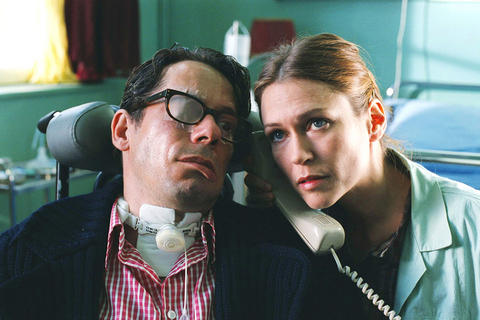Julian Schnabel has made three feature films: Basquiat, Before Night Falls and now The Diving Bell and the Butterfly. All are biographical, examining the lives of real people, and in each case the protagonist struggles with a condition of literal or metaphorical imprisonment.
Jean-Dominique Bauby, a French fashion magazine editor and the author of the international best seller on which The Diving Bell and the Butterfly is based, suffered a stroke in his 40s that left him in a rare affliction called "locked-in syndrome." He retained vision and hearing, and his mind continued to function perfectly, but his body was almost completely paralyzed. He could not move or speak. In the film a friend, visiting him in the hospital in Berck reports the latest gossip from the cafes of Paris: "Have you heard? Jean-Dominique is a vegetable."
"What kind of vegetable?" Jean-Dominique wonders. Like his condition, the metaphor is cruel, but not altogether unredeemable. As we come to understand in the course of this fierce and lovely film, his existence is not that of a vegetable but rather of a garden, a hothouse of consciousness, memory and ecstatic imagination.

PHOTO: COURTESY OF CMC
Jean-Dominique is played by Mathieu Amalric, a French actor whose twitching, antic physicality makes the character's immobility all the more painful. But The Diving Bell, true to its hero and its literary source, is neither morbid nor mawkish. Propped up in a wheelchair, able to communicate only by blinking his left eye, he remains a sensualist, a bon vivant and a keen literary wit.
But never a saint. Before his stroke Jean-Dominique led a life of glamour, pleasure and self-indulgence, for which he never apologizes.
The phrase "triumph of the human spirit" hovers over The Diving Bell and the Butterfly, along with a swarm of other empty, uplifting cliches. But Schnabel and the screenwriter, Ronald Harwood, have other themes in mind: limitation, constraint, incarceration. But Schnabel is not content simply to state or to dramatize this idea. Rather, he demonstrates his own imaginative freedom in every frame and sequence, dispensing with narrative and expository conventions in favor of a wild, intuitive honesty.
And yet he also shows astonishing formal control. The movie begins claustrophobically, as we see the blurry bustle of the hospital room from Jean-Dominique's hazy, panicked perspective. Faces loom suddenly and awkwardly into view, while his captive consciousness writhes in its cage, trying to make contact with the world outside.
After a while it does, with the help of a speech therapist who patiently teaches Jean-Dominique to turn his left eyelid into a means of communication. She sits beside him, reciting the alphabet and stopping when he blinks, piecing together words and sentences from his signals.
Later an amanuensis (Anne Consigny) takes her place, and together she and Jean-Dominique compose the compact, lyrical book that will become Schnabel's expansive, passionate film. Their attention also introduces both the patient and the audience to an intense, nonsexual intimacy that is itself a form of love.
And so, curiously enough, a movie about deprivation becomes a celebration of the richness of experience, and a remarkably rich experience in its own right. In his memoir Bauby performed a heroic feat of alchemy, turning horror into wisdom, and Schnabel, following his example and paying tribute to his accomplishment, has turned pity into joy.

Behind a car repair business on a nondescript Thai street are the cherished pets of a rising TikTok animal influencer: two lions and a 200-kilogram lion-tiger hybrid called “Big George.” Lion ownership is legal in Thailand, and Tharnuwarht Plengkemratch is an enthusiastic advocate, posting updates on his feline companions to nearly three million followers. “They’re playful and affectionate, just like dogs or cats,” he said from inside their cage complex at his home in the northern city of Chiang Mai. Thailand’s captive lion population has exploded in recent years, with nearly 500 registered in zoos, breeding farms, petting cafes and homes. Experts warn the

The unexpected collapse of the recall campaigns is being viewed through many lenses, most of them skewed and self-absorbed. The international media unsurprisingly focuses on what they perceive as the message that Taiwanese voters were sending in the failure of the mass recall, especially to China, the US and to friendly Western nations. This made some sense prior to early last month. One of the main arguments used by recall campaigners for recalling Chinese Nationalist Party (KMT) lawmakers was that they were too pro-China, and by extension not to be trusted with defending the nation. Also by extension, that argument could be

Aug. 4 to Aug. 10 When Coca-Cola finally pushed its way into Taiwan’s market in 1968, it allegedly vowed to wipe out its major domestic rival Hey Song within five years. But Hey Song, which began as a manual operation in a family cow shed in 1925, had proven its resilience, surviving numerous setbacks — including the loss of autonomy and nearly all its assets due to the Japanese colonial government’s wartime economic policy. By the 1960s, Hey Song had risen to the top of Taiwan’s beverage industry. This success was driven not only by president Chang Wen-chi’s

Last week, on the heels of the recall election that turned out so badly for Taiwan, came the news that US President Donald Trump had blocked the transit of President William Lai (賴清德) through the US on his way to Latin America. A few days later the international media reported that in June a scheduled visit by Minister of National Defense Wellington Koo (顧立雄) for high level meetings was canceled by the US after China’s President Xi Jinping (習近平) asked Trump to curb US engagement with Taiwan during a June phone call. The cancellation of Lai’s transit was a gaudy